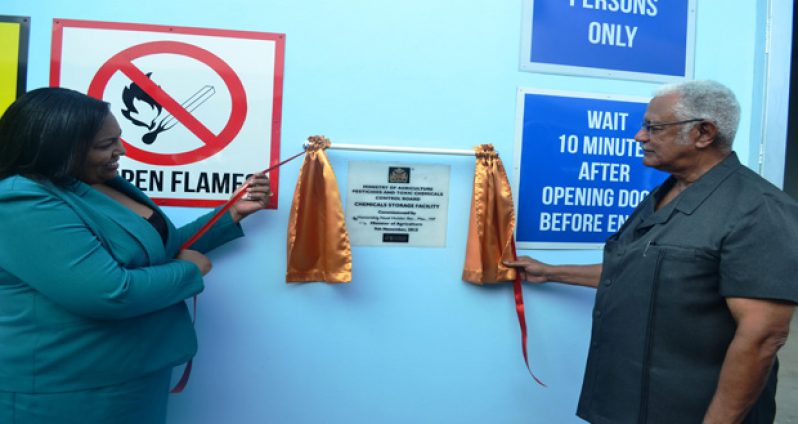IN RECENT years, Guyana has seen an increase in pesticide-related incidents. A trained and certified pesticide user has a right to access pesticides, but that pesticide user must protect all others by ensuring these toxic substances are stored properly.Agriculture Minister Noel Holder, during his address at commissioning of the Pesticides and Toxic Chemicals storage bond, situated in the NAREI Compound at Mon Repos, East Coast Demerara, said: “Today’s activity is important to every one of us, as it highlights this government’s commitment to protecting human health and safeguarding our environment from the negative effects of chemicals.
“Chemicals, most specifically pesticides, are used extensively in Guyana, and these chemicals — once used correctly — enhance the livelihood of all.”
The minister emphasised: “We believe that an informed public can take better control of its health and environment. Being educated about pesticides is a basic right.”
However, he noted that using improper storage procedures is an open invitation for a disaster to happen.
Nearly three-fourths of all pesticide accidents are non-use accidents that often involve children less than 10 years of age. Improper pesticide storage is therefore dangerous to your health and that of your family, and can harm the environment.
In April 2015, Minister Holder said, Guyana prohibited another 21 pesticides and toxic chemicals that are highly hazardous to human health and environment, “making us one of the very few countries in this region to be in compliance with our obligations to the Rotterdam and Stockholm Conventions and other chemicals Multilateral Environmental Agreements.”
The 2015 report coming out of the Caribbean regional group ranks Guyana as a leader in chemicals’ management, a position that does not diminish the fact that there is still more work to be done. The Pesticide Board and the Ministry of Agriculture are committed to continue to work in all areas necessary to ensure sound chemicals management.
The minister added that the Pesticides Board commits large sums of its annual budget to raising awareness on the safe handling, use, storage and disposal of pesticides. Over the years, this has seen thousands of persons being trained and educated, from the strata of government right down to the farmer in his field, to the children in schools and communities, and to the general public.
Minister Holder has further said that although there are benefits to be had in the use of pesticides, there have also been many problems associated with their use. Pesticides can move in the environment, in soil, water and air. Human exposure to pesticides has caused poisonings and the development of diseases like cancer and death.
Using pesticides requires detailed attention to label instructions as well as common sense and good judgment.
Underscoring that the use of toxic pesticides to manage pest problems has become a common practice around the world, the Agriculture Minister said these substances are used almost everywhere — not only in agricultural fields, but also in homes, schools, office buildings and airports, to name a few. It is difficult to find somewhere where pesticides are not used.
He added that pesticides have been linked to a wide range of human health illnesses, ranging from short-term impacts, such as headaches and nausea, to chronic impacts, like cancer, cognitive disorders, reproductive harm, and endocrine disruption. It is important to note that these health impacts are inherently linked to use practices.
“Our vision in ensuring the achievement of the Global Sustainable Development Goals also demonstrates our commitment to sound chemicals management, since seven of these goals are integrally linked to chemicals management,” Minister Holder asserted
“Agriculture was developed to produce crops and livestock for human consumption. As the human population increases, the amount of food produced is very important. Unfortunately, there are other organisms out there that wish to consume the crops that are meant for humans. The damage caused by agricultural pests is a global problem, and over the past half-century, the amount of pesticides used has increased fourfold.”
Over the years, the minister said, the widespread use of pesticides has had several benefits, but has also caused many problems. The benefits of pesticides include increased food production, increased profits for farmers, and the prevention of diseases. Due to the use of pesticides, it is possible to combat pests and produce larger quantities of food. By producing more crops, farmers are also able to increase profits by having more produce to sell.
Minister Holder urged all stakeholders of the chemicals industry in Guyana to use the Pesticides and Toxic Chemicals storage bond site as the model for storage facilities countrywide. “I wish to also encourage pesticide users, especially farmers and homeowners, to practise proper storage.”
The role of government (through the Pesticides Board) is to assist relevant industries in their responsibilities regarding chemicals’ management by sharing information, forming partnerships, and enforcing relevant legislation to manage the chemicals’ industry safely and effectively.
Besides safety and economics, improper storage of pesticides is contrary to regulations governing pesticide use. Government recognises the need for the regulators themselves to demonstrate proper storage.
By Rabindra Rooplall



.jpg)








